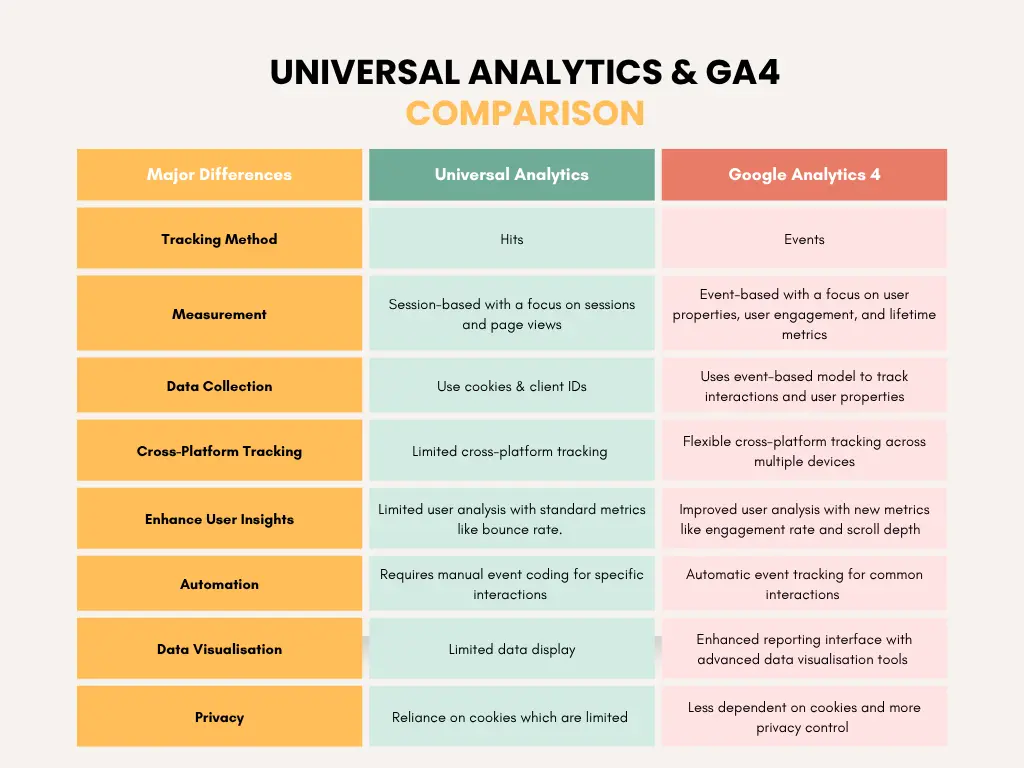A lot has happened in the world of Google Analytics over the past three years. In July 2023, Universal Analytics stopped processing new data. By July 2024, all Universal Analytics properties — including Universal Analytics 360 — were fully shut down, leaving Google Analytics 4 (GA4) as the only supported analytics platform from Google.
As with most major changes, the transition to GA4 has received mixed reception. However, it marks a significant shift in how businesses approach analytics — increasing both the relevance and, in many cases, the necessity of using BigQuery for deeper, more flexible insights. For many of our clients, implementing BigQuery is the fastest and most effective way to enhance analytics maturity — and this article explores why.
Understanding the Major Differences Between GA4 & Universal Analytics
To understand why BigQuery plays a bigger role in analytics today, it’s important to first grasp how GA4 differs from Universal Analytics. GA4 isn’t just a UI update — it represents a complete overhaul in how data is collected, structured, and accessed.
In this section, we break down the key differences — from data models and event tracking to reporting limitations and privacy controls — to highlight what’s new, what’s improved, and why these changes are pushing more businesses toward BigQuery for deeper, more flexible insights.

Why BigQuery Matters More in the GA4 Era
GA4’s shift to an event-based data model — combined with limitations like shorter look back windows and reduced reporting flexibility — has made BigQuery more essential than ever. For businesses of all sizes, it’s quickly becoming a must-have for unlocking the full potential of their analytics data. Here is why:
- Event-Based Model = More Granular Data: GA4 collects detailed, event-level data instead of session-based summaries. BigQuery gives you direct access to these granular events, enabling richer insights (e.g. funnel drop-off, multi-touch attribution, lifetime value modelling etc).
- Default UI Limitations: GA4’s built-in reporting is simplified and more limited than UA. Complex queries, historical comparisons, and advanced segmentation often require BigQuery. One of the biggest triggers for our clients integrating BigQuery with GA4 is accessing historical data for YoY comparisons.
- No Data Sampling: In GA4 + BigQuery you receive raw unsampled data. This is crucial for websites receiving less than 1000 visits where the small sample size can greatly skew insights. This is is also important for larger teams looking for precise return on investment and customer lifetime value analysis.
- Data Retention: GA4 UI only retains user data for a maximum 14 months. On the other hand BigQuery lets you store and analyse data indefinitely, which is critical for multi-year trend anaylyis and supports machine learning initiatives with deeper data sets.
- Lower Barrier to Entry with GA4: GA4 allows free exports to BigQuery for both standard and 360 users. Previously this export was only available for GA360 customers, which came at a high cost and was typical out of reach for smaller or mid-sized businesses.
Benefits of BigQuery for Retail Analytics
With the lions share of our customers having a retail element to their business, I have summarised the core use cases for implementing BigQuery in retail below:
- Improved Data Accuracy & Unified Data Capture: BiqQuery enables consistent and reliable data tracking across GA4, GTM and in-store systems to gain an accurate 360 degree view of the customer (bridging online & offline gaps)
- Deeper Ecommerce Performance Insights: BigQuery enables retailers to drill down into the performance of specific product categories, subcategories, and even individual SKUs (with accuracy).This level of granularity supports more precise merchandising strategies, including dynamic product placement, personalised promotions, and inventory planning.
- Strengthened Customer Journey Analytics: BigQuery supports tracking and analysing touch-points across digital and physical channels, offering rich insights into cross-channel behaviors and conversion paths. This includes websites, mobile apps, CRMS, store visits, call systems and loyalty systems
- Regulatory Compliance Validation: BigQuery helps organisations meet privacy regulations by offering tools and configurations to support data governance, security and auditability. BigQuery acts as both a compliance enabler and risk mitigation tool – critical in environments where consumer trust and regulator scrutiny is increasing.
- Advanced Analytics Infrastructure: BQ provides a scalable foundation for advanced analytics, enabling retailers to move beyond basic reporting toward deeper, more strategic intelligence. With built-in support for SQL-based analysis and native integration with tools like Looker Studio, teams can generate dynamic, real-time dashboards tailored to merchandising, marketing, and operations. BigQuery also allows native support for machine learning (BigQuery ML), allowing predictive models to be built directly in the the tool.
Tourism Case Study: Real World Applications of Implementing BigQuery
As part of a recent GA4 audit and implementation, we integrated BigQuery to unlock deeper insights and smarter targeting for a tourism operator in Ireland (Kelly Oysters Case Study). The Tourism Operator now has the ability to deliver targeted offers to tightly defined audience segments, dynamic website content based on a users preferences and past website behavior and product recommendations based on machine learning algorithms. This initiative formed part of a broader strategy by a national tourism body to build a unified data warehouse of micro tourism operators — creating the infrastructure to track travel patterns and visitor behavior across the target regions with far greater accuracy and agility.
Challenges & Considerations For Implementing BigQuery
By now I am sure we have you sold on the value of integrating GA4 with BigQuery. Before you dive head first into configuring your account and setting up your BQ pipelines there are a couple of key points to consider:
- Data Engineering Complexity: Setting up robust, scalable data pipelines from GA4 can require a degree of data engineering complexity.
- Skills Gaps: Teams may lack experience with SQL, BigQuery ML, or cloud infrastructure — slowing down adoption and limiting the tool’s potential.
- Cost Management: Query costs in BigQuery can scale quickly if not monitored. Inefficient SQL or lack of cost controls can lead to budget blowouts.
- Data Governance & Privacy: Ensuring compliance with data regulations (e.g. GDPR, Australian Privacy Act) demands clear data ownership, access controls, and auditability.
- Data Quality Issues: Without a clear data quality framework, ingesting inconsistent or incomplete data into BigQuery can compromise insights and trust.
Wrapping Up: Why BigQuery Is the Key to Unlocking GA4’s Full Potential
The shift to GA4 has fundamentally changed how businesses collect, analyse, and act on data. While the new model offers greater flexibility and precision, it also introduces limitations that make platforms like BigQuery essential for unlocking deeper insights and long-term value. From unsampled, event-level data to unlimited retention and native support for machine learning, BigQuery empowers businesses to go beyond the constraints of GA4’s default interface. For retailers and tourism operators alike, it opens the door to more accurate customer insights, smarter personalisation, and better decision-making at scale. However, realising these benefits requires careful planning — including strong data foundations, skilled resources, and governance structures to manage privacy, cost, and quality.
For teams looking to future-proof their analytics stack, BigQuery isn’t just a powerful add-on — it’s the key to turning GA4 data into a strategic advantage.





